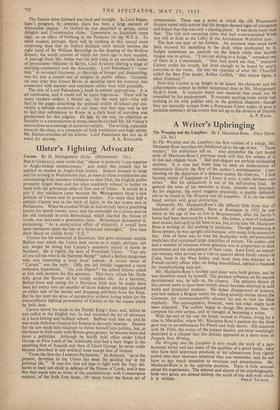Ulster's Fighting AdvQcate
Orson. By H. Montgomery Hyde. (Heinemann. 25s.) PHILIP GUEDALLA once wrote that "silence is posterity's one repartee to Anglo-Indian reminiscences," and today this remark can be applied to studies in Anglo-Irish history. Ireland loomed so large and for so long in Westminster that, as soon as those troublesome and entertaining Irish members withdrew to their Dail, the English public promptly forgot them and has since resolutely refused to bother its head with the grievances alike of Eire and of Ulster. It would be a pity if this inhibition came between Mr. ItIontgomery Hyde's new portrait of Carson and its potential readers. For more than half a century Carson was in the thick of fights; in the law courts and in. Parliament. When he crushed Wilde he had already been a practising lawyer for nearly twenty years, and his onslaught on Curzon and on his old comrade in arms Birkenhead, which startled the House of Lords, was delivered a generation later. Birkenhead denounced it, exclaiming: "As a constructive effort of statecraft, it would have been immature upon the lips of a hysterical schoolgirl." Few men drew blood so visibly from "F.E."
Carson has his memorial at Stormont, that grim eminence outside Belfast over which the Union Jack waves as it might, perhaps, not any longer be doing had Carson's ancestors stayed at home 'in Scotland. lie is rightly the hero of Protestant Ulster. "Can any of you tell me who is the Supreme Being?" asked a Belfast clergyman who was inspecting a local boys' school. A united shout of "Carson" was the reply. Orly one lad timidly suggested a more orthodox hypothesis. `Ah, you Papist!" his school fellows yelled at him with derision for this apostasy. This story, which Mr. Hyde tells, gives the flavour of his vividly written life. As a barrister, Belfast-born and sitting for a Northern Irish seat, he might have been led astray into yet another of those tedious apologia produced on either side of the border and dropping still-born from the Press. But he has kept his sense of perspective without losing relish for the extraordinary fighting personality of Carson or for the causes which he held dear.
Carson learnt his trade in the Dublin King's Inns, and, before he was called to the English bar, he had mastered the art of advocacy in a hard-hitting and brilliant school. Balfour took him up, and he was made Solicitor-General for Ireland in the early 'nineties. Passion for the law made him reluctant to throw himself into politics, but, as the threat to Irish unity with Britain grew greater, he became more and more a politician. Although he briefly held office under Lloyd George as First Lord of the Admiralty and had a busy finger in the upsetting first of Asquith and then of Lloyd George, he never really became absorbed in any political issue except that of Ireland.
"From the first day I entered Parliament," he declared, "up to the present, devotion to the Union has been the guiding star in my political life." It was this that led him to fight with the Tory die- hards in their last ditch in defence of the House of Lords, and it was this that made him so bitter at the establishmcnt, with Conservative support, of the Irish Free State. fir• never learnt the Saxon art of compromise. There was a point at which the old Westminster Gazette noted with sorrow that his brogue showed signs of corruption • and hoped that this was only a passing phase. It was never more than that. The rich and menacing voice that had cross-examined Wilde was still as Irish as the Liffey in the Archdeacon Wakeford case.
The face was part of the fortune. An innocent man could have been excused for trembling in the dock when confronted by it. Judges sometimes sat uneasily on the bench while that terrible tongue was in action. "I am not sitting as a Judge," remarked one of them at a Commission. "Any fool could see that," muttered Carson under his breath, but loud enough to be heard by nearly everyone in the room. He was the opposite of what Mr. Churchill called the Sinn Fein leader, Arthur Griffith, "that unique figure, a silent Irishman."
Now that Carson is no longer to be heard, his character and his achievements cannot be better recaptured than in Mr. MontgomerY Hyde's book. It contains much new material that could not be consulted by his predecessors. It recounts exciting trials which had nothing to do with politics and, in the Political chapters—though they are naturally written from a Protestant Ulster angle—it gives a readable summary of the events that led up to the division of Ireland.
A. P. RYAN.


































 Previous page
Previous page